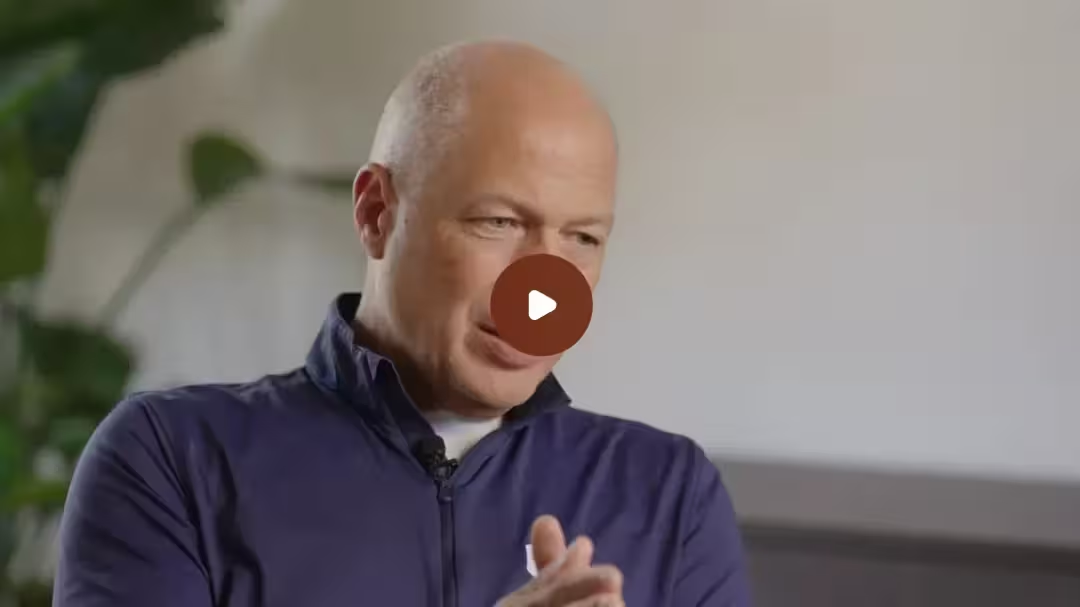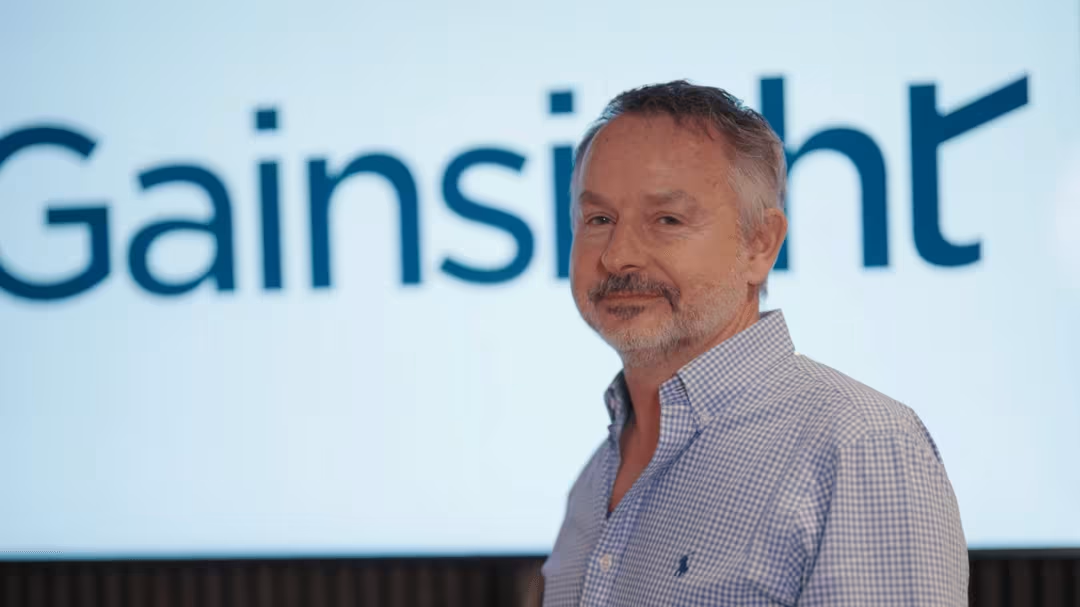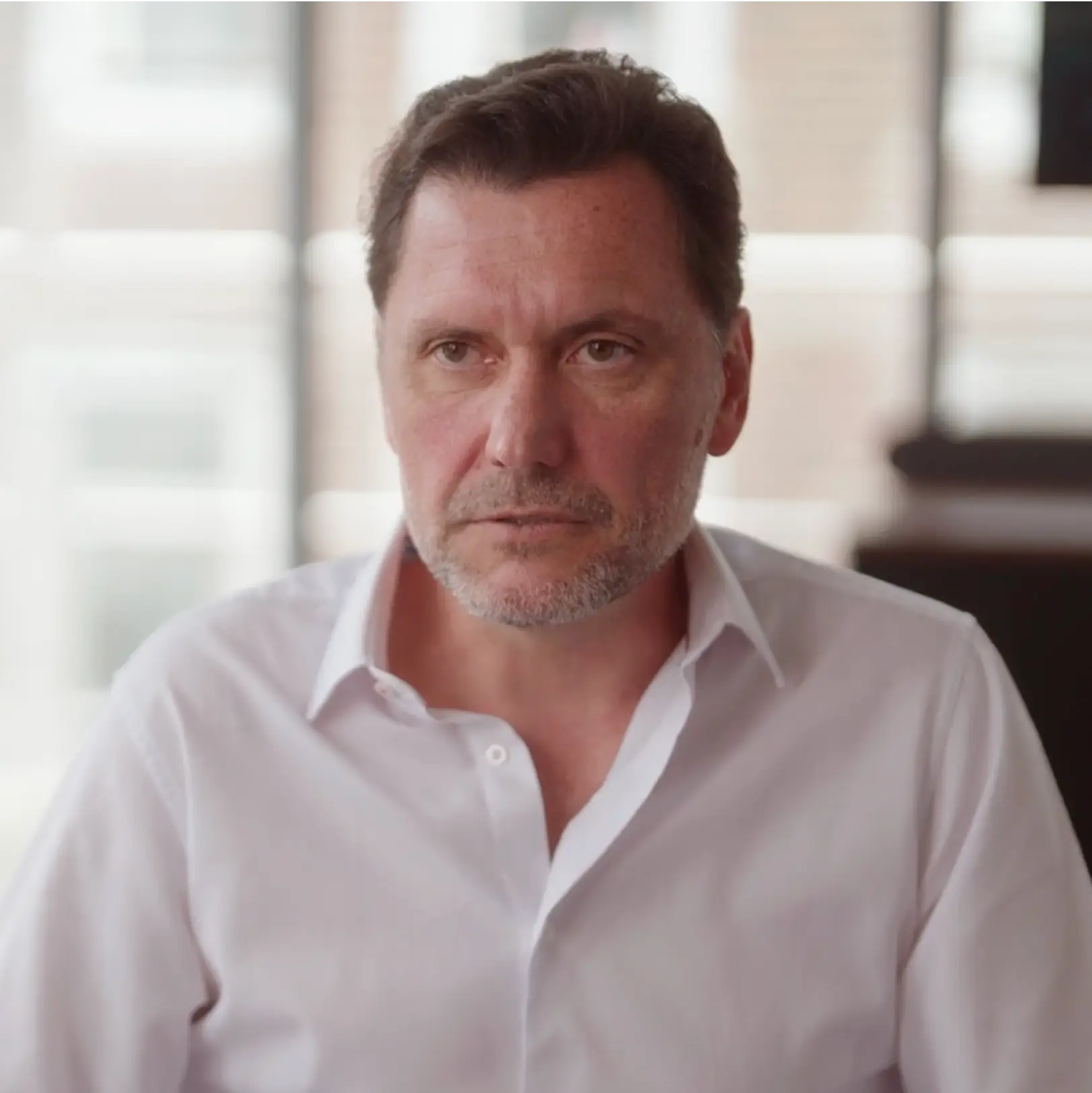The Interview
Kluster's Take
Tom spoke with Wayne Milano, Vice President, Go-To-Market Strategy; Revenue at Immuta. He focuses on strategies for learning and development - and alignment.
Wayne believes it's critical to tie together the cross divisions within an organisation. He joins together sales marketing, customer success and functional components. He has a unified philosophy, summarised by the quote “None of us is as smart as all of us”.
He brings together all the different personalities, emotions, passions around a common goal. When hiring Wayne looks for 5 Cs. These are capability, commitment, curiosity, courageousness and Creativity.
Wayne believes that diversity in the leadership team is critical. He sets up pods when looking at the talent pool, he doesn’t want everyone to have an identical mindset.
Transcription
My philosophy is a famous quote. None of us is as smart as all of us and has very, very important because this go-to-market strategy to bring all of us together for one common goal. Emission is my philosophy and passion in what I do today.
Pizza have you on the block today? Um, we're going to be talking about the culture of learning development, how we upskill reps, but let's begin with you. Um, so why don't we tell us, why don't you tell us a bit about your role? Your philosophy to leadership and how your life is impacted by that. Hey, look, first of all, thank you so much for having me today.
It's awesome to be part of this. So thank you. And, uh, to start off with your question, my role here at immuda, my official position is vice president of go-to-market strategy here at immuda. It's very, very important to us to look at, you know, where we are today and where we're going into the future. So when we look at, go to market, go tomorrow.
It's not just about marketing. It ties in everything from sales, marketing, customer success alliances, really bringing together the cross divisions and the functional components of the organization to have one unified approach, which is interesting because it really nicely plays into my philosophy. My philosophy is a famous quote.
None of us is as smart as all of us. And that's very, very important because this go-to-market strategy to bring all of us together for one common goal in this. Is my philosophy and passion and what I do today. So with that, uh, my role here at this organization is to bring together all the different personalities, the emotions, the passions, bring it all together to have one common goal, which is to carry forward immune into the future.
Okay, fantastic. I'm liking this with gangs and democratization of knowledge here when I'm sure we can feed in, but let's start at the very beginning. We might glance over this often, but it's worth reinforcing. Why is taking a deliberate approach to development of our reps and the people we lead important?
Absolutely. Look, we are back to my philosophy. None of us is smart as all of us. We are nothing without the people within the organization and each one of us bring some unique talent skill or insight. Uh, because if you had a team of people with all, you know, same personality, trait, same mindset, does it make us unique?
Does it add creativity? Quite honestly, it makes us a stagnant organization. So in terms of your question, it's very, very important to look at people from all different walks of life experiences. You know, we don't want people all with the same resume type. It's kind of interesting because when I talk to people I'm not interested really in tell me the success of your last five years.
Tell me about your losses lessons learned I'm more interested in the type of person you are, the mindset you carry forth, the things that you do in your life. Because when you look at the dynamic, the DNA of our culture, how do those building blocks help carry forth the company who could bring fresh creative ideas that maybe we haven't thought about?
I mean, even for me, sometimes I don't want a Salesforce of people that have been in the software industry or in a particular. How do we shake things up a little bit? How do we bring some fresh new creative ideas, but at the same time, you still need those old school conservative mindsets, because there's some truth to that.
But it's very, very important to us to think of now how to shake up the culture a little bit, uh, how to bring fresh, new, creative ideas. But it's very, very important to kind of keep that evolution going forward and that all starts with the people. So it's critical and extremely important. The people in the Oregon.
Yeah. Okay. This is great. And one very important thing you mentioned is about bringing those ideas, not just from diverse backgrounds, but from diverse parts of the org marketing sales, um, CS. Folks out there really trying to align these people and aligning them by the people they are. And the ideas they have is one approach that I haven't really spoken to many people about.
So how do we bring in these different people with different priorities along the same mission of driving the business forward inside a culture of learning, progression, sharing ideas, and improving ourselves? No, I'm going to take a step back to before I even dive into that. I think it's very important that when you're looking to solve.
What you just your question, take a step back and let's think about when we're recruiting people or we're looking to hire specific talent into the organization. I break it down in what I call the six CS. Let me talk to you about that if that's okay and I'll keep it high level. And if any of them are of interest, we can dive into it.
It's very important to recruit the right people with the right profile, with the specific skillset. And again, like I said, we don't want all, we don't want them all to look. But some of the things that jump out, number one for me is capability. You know, the skill to do the job, um, you know, the right mindset, the growth capability, the ability, the ability to think out of the box.
So do they have the capability number two, the commitment, you know, there's a ramp up time and you know what I, you hear? Hey, day one, we're expected you to do X, Y, and Z. There's a ramp up time and every profession and every specialty in the tech industry. So do they have that commitment during that ramp up time to stay true to it?
Then there's the curiosity aspect, which is very important. You know, do these people have curiosity to ask the right questions? Do they have curiosity to learn more? So that's another thing that I'm looking for courageous. You gotta be willing to sell high and being able to, uh, have conversations with people that maybe you're not comfortable having too.
So you gotta have that courageous. Creativity gotta think out of the box. That's a big thing for me. Um, you know, it's like, it's like Peyton Manning at the, at the, at the, uh, at the line of scrimmage, being able to read the defense and realize that, oh, um, I'm reading the read of the defense. I got to change the play on the fly.
Gotta be creative on the fly to change the play into react. But you know, the, the, the last one for me is the challenge aspect, uh, which is number six. Always willing to challenge yourself each and every single day, um, which ties into all the five CS that I mentioned above challenge yourself each step of the way, challenge yourself to be creative.
Challenge yourself, to go ahead and have courageousness to go in and talk to someone that maybe you were uncomfortable with in the beginning saying, oh, I'm intimidated by that persona. So why am I saying this? These six C's. Recruiting an attack attracting talent is so critical to that question you answered.
So you set that foundation right from day one. Does that answer your question or do you need me to elaborate? No, I think this answers a question and opens up another one. So the interesting thing about this for me is if I was a leader, if I was selling, hiring, we're looking for these six core components, but you said we're looking for those in diverse types of people.
How do we overcome any internal bias or patterns of thinking and structural thinking we have about people to be able to recognize them and people that that's, who might not have seen it before, you know, like how do we overcome our own patterns of thinking to see if those differences are important? If I had the answer to that, I be have a New York times bestselling book.
Right. But I could just tell you from experience, you know, that's also important why. You know, when you had the leadership team of the people in place already, the diversity of their background and their experience is very, very important because if you had a bunch of people, I'm just using this as an example, if you had a bunch of people that came from IBM or, or worked for another large software company, you're, you're already kind of thinking in that mindset.
So you want that diversity, large tech, small tech startup. You know, had the experience of maybe one or two exits. So you want that diversity from that leadership team. But I also think it's important to cycle that meaning not all the same people would be part of the process for new hires in terms of recruiting or actually attaining it.
So you want to kind of set up what I call the SWAT teams or these pods to help when you start really looking at the talent pool, because, you know, we don't want the same mindset each and every single. So it's important to have these discussion internally with the people saying, remember, what are our missions?
What is, what is our mission? What are our goals and what are the things that we need to get there? So it starts with people, right? So you got to have those internal education, refresher sessions. Before we start talking to talent. So we're all thinking, at least somewhat in the same way of how we're going to be looking at the talent pool.
Does that help? Yeah, that helps. And that pod idea is an interesting one. Um, I've heard some folks talk about that. I don't hear enough people talking about there. So could you explain what a pod is? How it works? Ah, man, it's been something that it's been near and dear to my heart for years. Yeah. When you look at.
The tech landscape. And I'm going to give you just kind of, from my perspective and my point of view, okay. I can't speak for others, but what I've seen over the past couple of years, customer, I mean, look, it's people buy from people, right? It is what it is, you know? Um, there's a lot of great technology out there.
There's a lot of technology that does a lot of very simple. Things, um, and some of them offer maybe one or two unique different capabilities. So it always comes back down to the people, right? It always comes down to the people. And what I've seen over the past five, 10 years is working with customers.
Customers want to know that a, that there's familiarity with the people that. Be that there's trust and the people that they're working with and see that it's the same people that are going to be working with me, not only during the sale, but after the sale, the consistency of the people, that relationship.
I mean, especially in the, the age of COVID look where we are in the last year. You don't get to see people face to face. You're doing a lot of this virtual. So knowing that you can build a rapport, this relationship virtual is a skill and it's a talent, and it's hard to teach that the pod concept ties nicely.
So over the past couple of years, when we've implemented teams, we've associated, Hey, in this pod, for example, sales pre-sales customer success, you have these pods working by region. So the customer and the partners know that you're interacting and working with the same people, the entire lifecycle of that relationship.
And that's critical. And I started to see this more and more, and I actually kind of did my own little experiments of like, okay, where were the pods and where were. Okay. So like I would take one region and implement the pod in the other region. I would let there be kind of a. Uh, you know, pick and choose as you go con and I noticed that in the pod region, those groups were highly more successful, not only the wind deals, but retain customers than the ones down below.
And I truly, truly believe it's that pod concept of in the age that we're at. I want to know that the people I'm working with, I can build a rapport. I trust them. And they're here with me for the whole experience and that relationship in that. Moving people on and off, uh, and you know, people sometimes lose faith, lose trust, sometimes lose interest.
So again, hopefully that answered your question, but I did a little experimenting with the last couple of years of putting pods in place purposeful and not the kind of see how these experiments would work out. Okay. So this idea of having that continuous seamless customer journey, that's pretty frictionless from that perspective.
Yeah. And getting people, working together, building our pores and relationships. Now on the flip side of that, people might have. Hey, Wayne, does it hit a point of stagnant? Does it say, wow, I've been working with the same person over the last two years. One might argue. Absolutely. He might hit that stagnant part.
So there's a whole nother aspect of how to keep people motivated, how to keep people fired up and excited. But that's where then when you look at the seas of the recruitment, having the curiosity, the ability to be creative, to challenge themselves, knowing that we're hiring with that type of person. I don't expect to see that stagnant because I know that that's in their DNA, those six seats.
So I'm hiring them, knowing that, Hey, you know, we might be in the third quarter of a football game or we're up 52 to 10. It doesn't mean we can get lazy. Doesn't mean we can just say, oh, you know, we got this thing in the books. It's over. No, always keep going. Always remain creative, always remain positive.
Uh, so again, uh, that is something that I wanted to just emphasize on because people might say, oh, wait, in that pod approach might have that negative aspects. So I wanted to least touch on why those six CS are critically important. So those pods don't become stagnant. Yeah. Okay. And that makes sense. You qualify those seas.
And from that you have people who are really gonna like be aligned, uh, suppose long-term with, uh, with a bunch of things that really matter in a business. Um, There's an interesting component of this for me. And if we're thinking about how we help train and upskill people, that pot idea is interesting because you're going to have like almost many cultures or folks.
So how do we then spread something that's works really well in one pod or something that another pod might be challenging with. So the whole business or team or function gets those ideas. And it's not just isolated or siloed between those people who have found those success or those challenges. That's one of the key things.
That's part of my role today, what I'm doing here at muda and, uh, to build on that, um, someone taught me early in my career, the success and failure of anything in life is the lack of, or the continuous of ongoing training education. Basically saying, if you don't continually do this and don't continue to challenge yourself or refresh yourself, There will be failures.
So don't let that happen. So to your point, you know, part of what we're doing here at immuda around our go-to-market strategies is the ongoing enablement, uh, across the organization. So, Hey, let's just pick on the example. You said, if there's things that are going really well within these pods, what can we learn from.
How do we share it across the organization? Right. So one of the key things I'm doing today is not only enabling people on our products, our partners, you know, the things that they need to go to market. But Hey, I noticed that somebody on the team and AMEA is doing something really awesome. We want to share with the rest of the organization.
Cause I say to people. You don't have to take a hundred percent of what you're doing and do it. Even if you take 1% of something that you learned today and it can improve what you're doing today, it's a wild success. So for me, it's always working with our peers internally, but also externally and networking to see, okay, what can we learn and gather and how do I share that?
So in simplistic terms, the ongoing education, the refreshers, the, you know, the unified approach. Is it critical and important. So I run this weekly schedule of enablement go-to-market sessions. Some are mandatory, some are not, but it's the best way to share information because my philosophy from the very beginning, none of us is smart as all of us.
The only way to do that is to set up these sessions and refreshers encourage people. You know, why they should be attending what's in it for them. And hopefully what they can get out of it. I always say, take 1% of something out of it. It's. Yeah. And that, that encouragement piece is important. One of the really inspiring things about you, Wayne is how, um, impassioned you all by learning.
Um, sometimes when I speak to leaders, you know, we, we can find reps to get very good at something and they get very used to something and that's the tone stay, even if it's at a high level. Um, so how would you spread that passion, um, and encouragement and engagement in your reps? They take this stuff on board, even if they're doing quite well for that.
You know, I'll before I answered that question, one of the things I told the muda was you're not hiring me for, for a particular skill of, you know, how I close deals. I mean, yes you are, but it's my network. And the reason why I'm saying that is, you know, if we can't get it directly internally, we'll find a way to get an externally through the network.
And that's extremely important. For me, I am blessed through the mentors. I had both positive and negative that have influenced me throughout my life. And I don't, and I'm not stopping on it. I'm always seeking out mentors or I'm seeking out additional information. And that's extremely critical in this success pattern in terms of what you just outlined, you know, sharing stories, collaborating with others, but making sure, um, that, you know, we're tapping into others that said, Hey, here's some that's worked for us.
You know, I know I want to share with others. It's extremely critical, extremely important. So, you know, I'll pause here and let you kind of dive a little bit more into it. But the network of people that we're surrounded by and sharing that with others is extremely critical. And you know, for me personally, it's been the success of my journey and it's not.
Is the network and reaching out to people and then taking that and sharing with others. And like I said, it might not work for everybody might not apply to everybody, but if they can take something out of it and say, you know what, I haven't thought of that. Thank you for doing that. And wow. You know, so-and-so at that company and they came to speak to us.
That's awesome. So I'll just pause there. Um, if you want me to elaborate on any of the, uh, you know, a little topic a little bit more, please ask me happy to do it. Yeah. Well that sounds like it feeds into your point earlier around putting yourself in challenging situations. It doesn't just have to be in this situation.
Find difficult. It can be being around someone who does something differently than you do. Um, on that point, Wayne, like. Often we hear things that we could be doing better, but there's almost a fear of changing the way we do it because of the risk. What if it doesn't work out? What if my results drops? How do you overcome that piece with your network and the people you bring into inspire and the way that you inspire in yourself?
Okay. Less than sometimes. Failure's a good thing. Let me start off by saying that I really appreciate when someone comes to me and says, Wayne, I've tried three things. Let me show you what I think. And Wayne, I don't know. I'm not getting, I'm not getting the results that I thought, the fact that you tried and you showed, Hey, here's the three things that I did.
That's okay to fail. And it's okay to raise your hand and ask questions. That's how we learn. I, the same thing for me, I failed miserably in so many, but they were learning experience. That helped me better for the next journey of my career and my next assignment. So I look at these failures as a blessing.
I don't look at them as, as a negative at all. Um, I wish I knew them sooner, but Hey, it is what it is. So, I mean, again, answer your question. You know, the, the success and failures are all stepping stones and learning experiences. We need them every single way, but I really appreciate when someone says, Hey, Wayne, I've tried this and it didn't work.
So I tweet. And that didn't work. And then this way, do you have any suggestions or ideas? Love it. That's awesome. Show me what really is disappointing. When someone says I tried this one thing, Wayne, and I just can't do it. I give up back to my six CS creativity, the courageousness, the curiosity, the capability.
So again, why look for these things in people? Because if we're all thinking this way, how are we going to fail? How are we going to fit? But in life we've seen failures. I mean, there's, you know, versions what? Right. Cause maybe the first version 1.0 it was okay. Something didn't work. So we made version two.
That's. Okay. That's the beauty of life. As long as we're all still thinking the same way, we're on the same mission together. There do come the points we have to come to the realization like, Hey, maybe I hate to call the, you know, maybe, you know, the, the product's ugly. Maybe we accept the realize that maybe something's wrong here.
But we got to give it a try. We gotta be able to measure against that. Like, Hey set some goals and targets. What's working. What's not, uh, and Hey, you know what, maybe we didn't hit the goal a hundred percent. Oh, is there a pattern of success and repeatability? And then what can we tweak? And that's, you know, that's what I'm looking for.
So hopefully that answers your question, uh, in terms of what you were seeking out there now. Definitely. And in a role like sales, for example, you're going to fail a lot, so it's good to tap away with feeling positive about that and take something constructive. Um, shouldn't be embarrassing. Yes. Great learning experience.
Yeah, not for sure. Okay. Final question for you. If you're in a room full of leaders, they could be revenue leaders. It could be whatever leadership type you want, and you could ask them one question. And if these people are the best in the world at what they do, what would that question be?
What would that one question be? Let me go back to what I said very, very early about. Things I look for in people, you know, I'm not interested in tell me about the success you had or tell me the failures you had, or, you know, I'm more interested in, you know, tell me about you. Um, where am I going with this?
I'll get there in a minute, but I'm interested in people. What makes them tick? What makes them motivated? What's their passions, because if I can hear that and I can correlate a pattern, a trait, or a true. You know, then I can figure that out and use it. So if I had to ask people in a room to your example, I would probably say, what would be the advice you would give yourself 10 years ago?
Right. You know, take a step back and say, Hey, if I can go back and tell Wayne 10 years earlier now, based on what I know to do. What are those top three things? What would it be? That's what I'm interested in. And I wouldn't purposely say from a sales per se, you know, sales profession, you know, it could be anything, it could be personal, it could be professional.
I'm very interested in hearing that, uh, because you know, I look for those particular traits and individuals, how their minds work and think, um, it tells a story. Which, you know, to me then it's like, okay, what makes them tick? And then I'm curious what that advice might be to the younger cells to see what path they would put them on.


.svg)
.svg)
.svg)
.svg)










